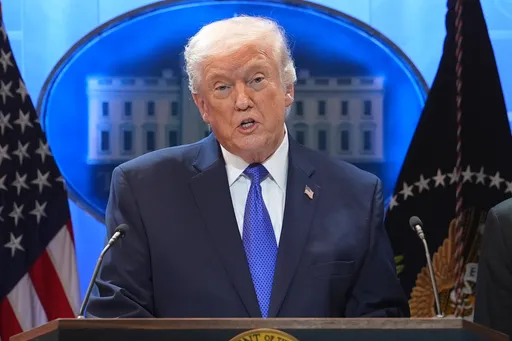Iran’s Supreme Leader, Ali Khamenei, has responded to several complaints about the Guardian Council’s list of candidates for presidential elections on 18 June. Earlier, President Hassan Rouhani said he had no choice but to write to the Supreme Leader to complain about the selective list. He was not alone. Many loyalist insiders at the core of the regime are disgruntled.
Ayatollah Khamenei says the vetting by the Guardian Council does not mean those who have been deselected are not capable, “It just means the Council did not recognise their capabilities for some reason.” The response has been ridiculed.
Of the 40 candidates who met the Council’s basic criteria only seven were approved, five are hardliners, two are lower profile, one a reformist and the other a moderate. The selection blatantly strengthens the chances of the judiciary chief Ebrahim Raisi, who is the main candidate for the hardliners.
The former parliamentary speaker, Ali Larijani, and the former Vice President, Eshaq Jahangiri, both running on a moderate ticket, were deselected as were famous reformist contenders such as Mostafa Tajzadeh.
“This is not just engineering elections,” Tweeted Saeed Shariati, a well-known reformist. “It is full scale interior architecture pre-defining even where the sofa should be placed,” he said.
The selection was so banal that even Raisi, allegedly groomed for the post, complained saying he wanted to “have more competition”. The social media hashtag was “appointments 2021” to replace “elections 2021”.
The expectation is that at a later stage the four hardliners will leave the race in favour of Raisi, a man widely accused of human rights violations. A second possible scenario is that if there was too much opposition, Raisi will pull out in favour of the former nuclear negotiator Saeed Jalili, also close to Khamenei.
The former head of the Judiciary, Sadeq Larijani, had the most damning reaction. He said in 20 years at the Guardian Council he had never before found decisions by the Council so “indefensible”.
Yet, the final approval could only have come from Ayatollah Khamenei as we see from his full throated defence of the Guardian Council.
Presidential elections and Vienna
Inter-related and even more intriguing was the extension on Monday of the IAEA access to Iran’s nuclear sites by a month, to June 24. This was the first indication that the supreme leader is keen to revive the nuclear deal, the Joint Comprehensive Plan Of Action. Despite his hard rhetoric to the contrary, Ayatollah Khamenei is demonstrating flexibility over the IAEA inspections for the second time. His motive could only be the lifting of all US sanctions.
Ideally, the Ayatollah is hoping that by 24 June and beyond, if negotiations in Vienna need to continue, then the new hardline president, presumably Raisi, would conveniently be at the helm. Raisi, who was formerly opposed to the deal, is already adjusting his position stressing the importance of economic relations with the world.
“Vienna talks are a calculated manoeuvre for elections,” said Gen. Saeed Mohammad, former head of the powerful IRGC Khatam ul-Anbia Headquarters, who was dropped from the race perhaps precisely for making that connection.
Iran’s main negotiator in Vienna, Abbas Araqchi, says key issues remain unresolved but that the fifth round of talks is “heading in the right direction”. Araqchi who is close to the supreme leader is now tasked with getting the Americans to agree to lifting sanctions from some 700 officials on the list, most of them IRGC members.
The US has agreed to remove many of the Trump-era banking and oil sanctions but is not giving up on those against Iran’s human rights violations or those on the IRGC officials
What became of Zarif?
One person missing from the talks in Vienna and from the presidential elections is Foreign Minister, Javad Zarif, who was the top candidate of the reformist and moderate camps but refused to register.
Zarif has been mostly away from Iran since his leaked interview revealed tension with the IRGC. He went for a regional tour of the Arab states of the Persian Gulf, onto the Far East, then to Europe and the Middle East, Central Asia and the Caucuses. This may be part of his end-of-term farewell but he is also keeping out of harm's way.
Iran’s leader reprimanded Zarif saying he had made “a major mistake” effectively giving the go-ahead for the hardliners to put him on trial. Hardline press labelled his revelations as “treason”. And prior to that, an IRGC masterminded television serial called Gando ridiculed Zarif and portrayed members of his team as MI6-connected "spies”. Zarif has rejected both.
The issue will not go away and once the elections are over if Zarif is in Iran he is likely to be taken in for grilling at the revolutionary court. His future is precarious. He may indeed be safer migrating.
With the election ducks in order, Iranians striving for freedom and justice see that there is no end to deceit and machinations by this regime. They have lost all hope for the future and the majority are predicted to boycott the elections.
And for the Western powers too, the dilemma intensifies as to how far at the Vienna talks they can trust a highly militarised theocracy, now totally devoid of any possibility of reform or moderation.
Yet much of the blame must also fall on the 'maximum pressure' campaign of the Trump administration that destroyed the JCPOA and strengthened the hardliners in Iran.























